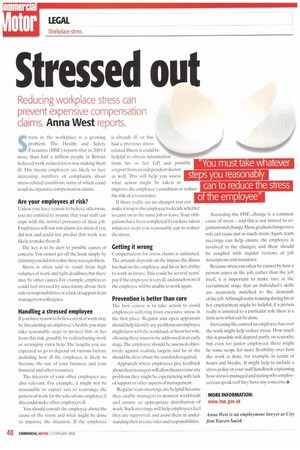Stressed out
Page 40

If you've noticed an error in this article please click here to report it so we can fix it.
Reducing workplace stress can prevent expensive compensation
claims. Anna West eports.
Stress in the workplace is a growing problem. The Health and Safety Executive (USE) reports that in 2003/4 more than half a million people in Britain believed work-related stress was making them ill. This means employers are likely to face increasing numbers of complaints about stress-related conditions, some of which could result in expensive compensation claims.
Unless you have reason to believe otherwise, you are entitled to assume that your staff can cope with the normal pressures of their job. Employees will not win claims for stress if you did not, and could not, predict that work was likely to make them ill.
Are your employees at risk?
The key is to be alert to possible causes of concern. You cannot get off the hook simply by claiming you did not realise there was a problem.
Stress is often said to result from high volumes of work and tight deadlines, but there may be other causes. For example, employees could feel stressed by uncertainty about their role or responsibilities.or a lack of support from managers or colleagues.
Handling a stressed employee
If you have reason to believe stress at work may he threatening an employee's health, you must take reasonable steps to protect him or her from this risk, possibly by redistributing work or arranging extra help. The lengths you are expected to go to depend on various factors, including how ill the employee is likely to become, the size of your business, and your financial and other resources.
The interests of your other employees are also relevant. For example. it might not he reasonable to expect you to rearrange the pattern of work for the sake of one employee if this could make other employees ill.
You should consult the employee about the cause of the stress and what might be done to improve the situation. If the employee is already ill, or has had a previous stressrelated illness, it could be helpful to obtain information from his or her GP, and possibly a report from an independent doctor as well. This will help you assess what action might he taken to improve the employee's condition or reduce the risk of a recurrence.
If there really are no changes you can make it is upto the employee to decide whether to carry on in the same job or leave. Your obligations have been completed if you have taken whatever steps you reasonably can to reduce the stress.
Getting it wrong .ompensation for stress claims is unlimited. The amount depends on the impact the illness has had on the employee and his or her ability to work in future. 'Ibis could be several y,'ears' pay if the employee is very ill,and much more if the employee will be unable to work again.
Prevention is better than cure
The best course is to take action to avoid employees suffering from excessive stress in the first place. Regular and open appraisals should help identify any problems an employee might have with the workload.or his or her role, allowing these issues to be addressed at an early stage. The employee should be assessed objectively against realistic targets, and he or she should be clear about the standards required.
Appraisals where employees give feedback about their managers will allow them to raise any problems they might be experiencing with lack of support °rot her aspects of management.
Regular team meetings are helpful because they enable managers to monitor workloads and ensure an appropriate distribution of work. Such meetings will help employees feel they are supported, and assist them in understanding their precise roles and responsibilities According the HSE, change is a common cause of stress — and this is not limited to organisational change. More gradual changes to a role can cause just as much stress. Again, team meetings can help ensure the employee is involved in the changes, and these should be coupled with regular reviews of job descriptions and mandates.
Because stress can often be caused by how a person copes in the job, rather than the job itself, it is important to make sure at the recruitment stage that an individual's skills are accurately matched to the demands of the job. Although some training during his or her employment might be helpful, if a person really is unsuited to a particular role there is a limit as to what can be done.
Increasing the control an employee has over the work might help reduce stress How much this is possible will depend partly on seniority. but even for junior employees there might be some scope for more flexibility over how the work is done, for example in terms of hours and breaks It might help to include a stress policy in your staff handbook explaining how stress is managed and stating who employees can speak to if they have any concerns. •
MORE INFORMATION: www.hse.gov.uk




























































































































































































